|
|
|
Sort Order |
|
|
|
Items / Page
|
|
|
|
|
|
|
| Srl | Item |
| 1 |
ID:
106959
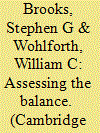

|
|
|
|
|
| Publication |
2011.
|
| Summary/Abstract |
Save for the single issue of balance of power theory's relevance to the current system, where we and some of our critics are in real disagreement (and they are wrong), every aspect of this symposium has been highly productive. Our critics do not directly dispute the proposition that a rapid end of a single superpower world is extremely unlikely. They generally endorsed our core finding that the systemic constraints featured in IR scholarship are largely inoperative with respect to a United States that remains the sole superpower. These essays are consequently devoted mainly to discussing the implications of our findings and the future research agenda. In particular, they developed serious challenges to the idea of US led institutional revisionism, generated new ideas about both systemic and non-systemic constraints, and suggested potentially powerful theories about constraints on other states besides the United States.
|
|
|
|
|
|
|
|
|
|
|
|
|
|
|
|
| 2 |
ID:
117446
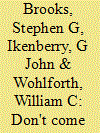

|
|
|
|
|
| Publication |
2012.
|
| Summary/Abstract |
After sixty-five years of pursuing a grand strategy of global leadership-nearly a third of which transpired without a peer great power rival-has the time come for the United States to switch to a strategy of retrenchment? According to most security studies scholars who write on the future of U.S. grand strategy, the answer is an unambiguous yes: they argue that the United States should curtail or eliminate its overseas military presence, abolish or dramatically reduce its global security commitments, and minimize or eschew efforts to foster and lead the liberal institutional order. Thus far, the arguments for retrenchment have gone largely unanswered by international relations scholars. An evaluation of these arguments requires a systematic analysis that directly assesses the core claim of retrenchment advocates that the current "deep engagement" grand strategy is not in the national interests of the United States. This analysis shows that advocates of retrenchment radically overestimate the costs of deep engagement and underestimate its benefits. We conclude that the fundamental choice to retain a grand strategy of deep engagement after the Cold War is just what the preponderance of international relations scholarship would expect a rational, self-interested leading power in America's position to do.
|
|
|
|
|
|
|
|
|
|
|
|
|
|
|
|
| 3 |
ID:
021471
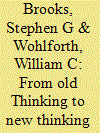

|
|
|
|
|
| Publication |
Spring 2002.
|
| Description |
93-111
|
|
|
|
|
|
|
|
|
|
|
|
|
|
|
|
| 4 |
ID:
163308
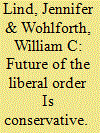

|
|
|
|
|
| Summary/Abstract |
The liberal world order is in peril. Seventy-five years after the United States helped found it, this global system of alliances, institutions, and norms is under attack like never before. From within, the order is contending with growing populism, nationalism, and authoritarianism. Externally, it faces mounting pressure from a pugnacious Russia and a rising China. At stake is the survival of not just the order itself but also the unprecedented economic prosperity and peace it has nurtured
|
|
|
|
|
|
|
|
|
|
|
|
|
|
|
|
| 5 |
ID:
110848
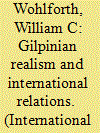

|
|
|
|
|
| Publication |
2011.
|
| Summary/Abstract |
I argue that realism in particular and IR more generally erred by assigning Kenneth Waltz's Theory of International Relations pride of place in revivifying realist thought. Had Robert Gilpin's War and Change in World Politics been given equal billing, international relations research would have unfolded quite differently over the past three decades. Scholars would not have been bewildered by change, bewitched by the balance of power, blind to numerous potentially powerful realist theories, and bothered by endless and unproductive zero-sum debates among representatives of competing paradigms. And had all those pathologies been absent, we would be far better prepared today for the intellectual and policy challenges of a world in which underlying power balances appear to be changing quickly, and the status quo inter-state order is ever more contested.
|
|
|
|
|
|
|
|
|
|
|
|
|
|
|
|
| 6 |
ID:
065314
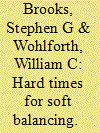

|
|
|
| 7 |
ID:
067390
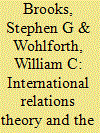

|
|
|
| 8 |
ID:
179500


|
|
|
| 9 |
ID:
160123
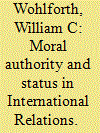

|
|
|
|
|
| Summary/Abstract |
We develop scholarship on status in international politics by focusing on the social dimension of small and middle power status politics. This vantage opens a new window on the widely-discussed strategies social actors may use to maintain and enhance their status, showing how social creativity, mobility, and competition can all be system-supporting under some conditions. We extract lessons for other thorny issues in status research, notably questions concerning when, if ever, status is a good in itself; whether it must be a positional good; and how states measure it.
|
|
|
|
|
|
|
|
|
|
|
|
|
|
|
|
| 10 |
ID:
140172
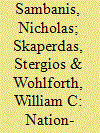

|
|
|
|
|
| Summary/Abstract |
How do the outcomes of international wars affect domestic social change? In turn, how do changing patterns of social identification and domestic conflict affect a nation’s military capability? We propose a “second image reversed” theory of war that links structural variables, power politics, and the individuals that constitute states. Drawing on experimental results in social psychology, we recapture a lost building block of the classical realist theory of statecraft: the connections between the outcomes of international wars, patterns of social identification and domestic conflict, and the nation’s future war-fighting capability. When interstate war can significantly increase a state’s international status, peace is less likely to prevail in equilibrium because, by winning a war and raising the nation’s status, leaders induce individuals to identify nationally, thereby reducing internal conflict by increasing investments in state capacity. In certain settings, it is only through the anticipated social change that victory can generate that leaders can unify their nation, and the higher anticipated payoffs to national unification makes leaders fight international wars that they would otherwise choose not to fight. We use the case of German unification after the Franco-Prussian war to demonstrate the model’s value-added and illustrate the interaction between social identification, nationalism, state-building, and the power politics of interstate war.
|
|
|
|
|
|
|
|
|
|
|
|
|
|
|
|
| 11 |
ID:
106339


|
|
|
|
|
| Publication |
2011.
|
| Summary/Abstract |
Responding to the special issue editors request, I conduct a retrospective evaluation of my own scholarship on realism and the end of the Cold War. I reprise the main arguments in light of what appears to be the most probative new evidence. I find that ,even though almost all scholars who write about the Cold War's end either dismiss or denounce explanations informed by realist theory, these explanations actually have stood the test of time and new evidence.
|
|
|
|
|
|
|
|
|
|
|
|
|
|
|
|
| 12 |
ID:
144610
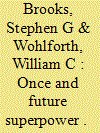

|
|
|
|
|
| Summary/Abstract |
After two and a half decades, is the United States’ run as the world’s sole superpower [1] coming to an end? Many say yes, seeing a rising China [2]ready to catch up to or even surpass the United States in the near future. By many measures, after all, China’s economy is on track to become the world’s biggest, and even if its growth slows, it will still outpace that of the United States for many years. Its coffers overflowing, Beijing has used its new wealth to attract friends, deter enemies, modernize its military, and aggressively assert sovereignty claims in its periphery. For many, therefore, the question is not whether China will become a superpower but just how soon.
|
|
|
|
|
|
|
|
|
|
|
|
|
|
|
|
| 13 |
ID:
168920


|
|
|
|
|
| Summary/Abstract |
When and under what conditions does hegemony pay? The fate of any hegemonic order hinges on the answer to this question. Notwithstanding major relevant research traditions, international relations scholarship remains poorly equipped to answer it. We fill this gap with a theoretical framework for understanding the costs and benefits of hegemony that identifies the conditions that affect potential complementarity between military protection and economic production. We show how this relationship varies in different international systems in ways that confounded previous research. Contrary to widely held views in US domestic politics and in the security studies research community, we argue that under current conditions complementarity between protection and production means the maintenance of hegemonic order remains beneficial to the United States.
|
|
|
|
|
|
|
|
|
|
|
|
|
|
|
|
| 14 |
ID:
176023
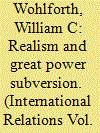

|
|
|
|
|
| Summary/Abstract |
I present a realist theory of subversion among great powers, an understudied phenomenon in the burgeoning literature on subversive statecraft. I show that a simple, rational cost-benefit calculus accounts for comparatively low-levels of subversion among non-belligerent great powers, much higher levels among belligerent great powers, and more frequent, violent and larger-scale subversion against weaker targets. Brief case studies of mid-twentieth century subversion featuring the Soviet Union and the United States illustrate the theory and provide preliminary support. Theory and evidence show that the conditions that are conducive to highly consequential subversion among great powers are quite limited and reversible. This gives rise to skepticism concerning claims that today’s strategic environment has fundamentally transformed the nature of great power rivalry so as to accord a newly central place to subversion.
|
|
|
|
|
|
|
|
|
|
|
|
|
|
|
|
| 15 |
ID:
086024
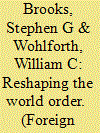

|
|
|
|
|
| Publication |
2009.
|
| Summary/Abstract |
Creating a league of democracies, revamping the UN Security Council, revitalizing the nuclear nonproliferation regime -- proposals for revising international institutions are all the rage these days. And for good reason: no one sitting down to design the perfect global framework for the twenty-first century would come up with anything like the current one. The existing architecture is a relic of the preoccupations and power relationships of the middle of the last century -- out of sync with today's world of rising powers and new challenges, from terrorism and nuclear proliferation to financial instability and global warming.It is one thing to agree that change is needed, but quite another to settle on its specifics. As soon as the conversation shifts to brass tacks, competing visions begin to clash. In an anarchic world of self-interested states -- that is to say, in the real world -- the chances that those states will cooperate are best when a hegemon takes the lead. There are, of course, good reasons to question whether the United States, the only contender for such a role today, is up to the task. Under the George W. Bush administration, consideration of global institutional change fell through the cracks. The administration did not invest much in international institutions and tended to denigrate them for hindering, rather than enabling, the realization of U.S. interests. But with the election of President Barack Obama, the United States' reluctance to push for institutional change now appears to have ended. In a 2007 address to the Chicago Council on Global Affairs, Obama stressed that "it was America that largely built a system of international institutions that carried us through the Cold War. . . . Instead of constraining our power, these institutions magnified it." "Today it's become fashionable to disparage the United Nations, the World Bank, and other international organizations," he continued. "In fact, reform of these bodies is urgently needed if they are to keep pace with the fast-moving threats we face."
|
|
|
|
|
|
|
|
|
|
|
|
|
|
|
|
| 16 |
ID:
143221
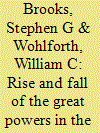

|
|
|
|
|
| Summary/Abstract |
Unipolarity is arguably the most popular concept used to analyze the U.S. global position that emerged in 1991, but the concept is totally inadequate for assessing how that position has changed in the years since. A new framework that avoids unipolarity's conceptual pitfalls and provides a systematic approach to measuring how the distribution of capabilities is changing in twenty-first-century global politics demonstrates that the United States will long remain the only state with the capability to be a superpower. In addition, China is in a class by itself, one that the unipolarity concept cannot explain. To assess the speed with which China's rise might transform this into something other than a one-superpower system, analogies from past power transitions are misleading. Unlike past rising powers, China is at a much lower technological level than the leading state, and the gap separating Chinese and U.S. military capabilities is much larger than it was in the past. In addition, the very nature of power has changed: the greatly enhanced difficulty of converting economic capacity into military capacity makes the transition from a great power to a superpower much harder now than it was in the past. Still, China's rise is real and change is afoot.
|
|
|
|
|
|
|
|
|
|
|
|
|
|
|
|
| 17 |
ID:
077412
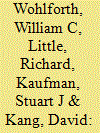

|
|
|
|
|
| Publication |
2007.
|
| Summary/Abstract |
The balance of power is one of the most influential theoretical ideas in international relations, but it has not yet been tested systematically in international systems other than modern Europe and its global successor. This article is the product of a collective and multidisciplinary research effort to redress this deficiency. We report findings from eight new case studies on balancing and balancing failure in different international systems that comprise over 2000 years of international politics. Our findings are inconsistent with any theory that predicts a tendency of international systems toward balance. The factors that best account for variation between balance and hegemony within and across international systems lie outside all recent renditions of balance-of-power theory and indeed, international relations scholarship more generally. Our findings suggest a potentially productive way to reframe research on both the European and contemporary international systems.
|
|
|
|
|
|
|
|
|
|
|
|
|
|
|
|
| 18 |
ID:
085924


|
|
|
|
|
| Publication |
2009.
|
| Summary/Abstract |
American primacy in the global disrtribution of capabilities is one of the most salient features of the contemporary international system.The end of the cold war did not return the world to multipolarity.Instead the United States-already materially preeminent-became more so.
|
|
|
|
|
|
|
|
|
|
|
|
|
|
|
|
| 19 |
ID:
085925


|
|
|
|
|
| Publication |
2009.
|
| Summary/Abstract |
Does unipolarity promote peace among major powers? Would the return of multipolarity increase the prospects for war? Although unipolarity has been marked by very low levels of militarized competition among major power, many scholars doubt whether the association is causal.
|
|
|
|
|
|
|
|
|
|
|
|
|
|
|
|
|
|
|
|
|